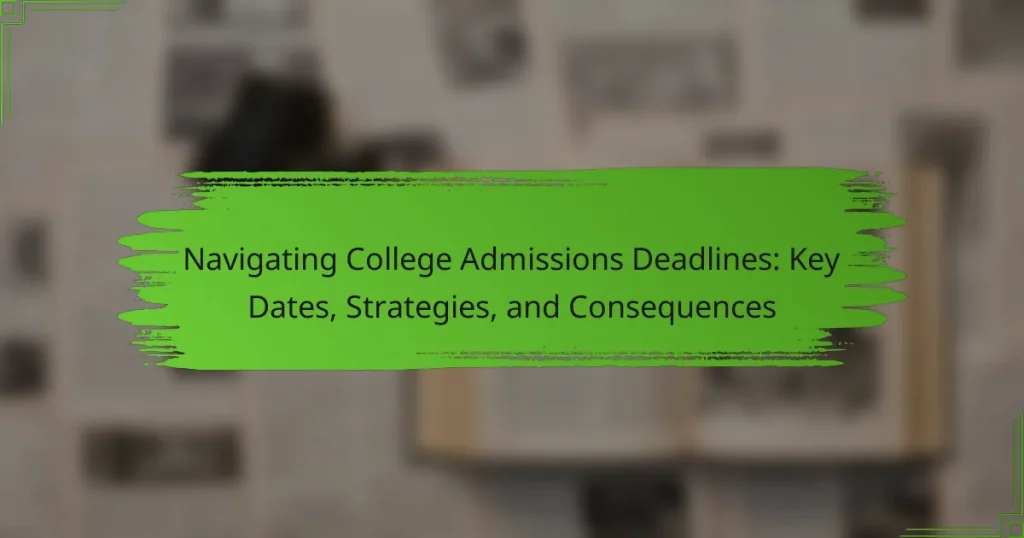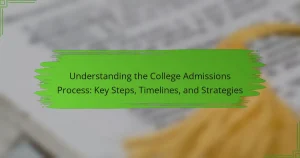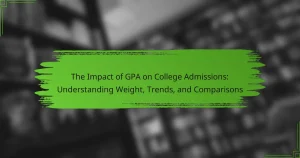
What are the key college admissions deadlines?
Key college admissions deadlines include application submission dates, financial aid deadlines, and decision notification dates. Most colleges have early action or early decision deadlines around November 1st. Regular decision deadlines typically fall between January 1st and February 1st. Financial aid applications, such as the FAFSA, are usually due by early February. Colleges often notify applicants of their decisions by mid to late March. Accepted students typically have until May 1st to enroll. These dates can vary by institution, so checking specific college websites is essential.
How do application deadlines vary by institution?
Application deadlines vary significantly by institution. Each college or university sets its own timeline for admission applications. Some institutions have early decision or early action deadlines, typically falling between October and November. Regular decision deadlines generally occur between January and February. Additionally, some schools offer rolling admissions, allowing students to apply at any time until the program fills. For instance, highly selective universities may have earlier deadlines compared to community colleges. This variability requires prospective students to carefully check each institution’s specific deadlines to ensure timely submission.
What are the different types of deadlines (early action, regular decision, etc.)?
The different types of college admissions deadlines include Early Action, Early Decision, Regular Decision, and Rolling Admissions. Early Action allows students to apply early and receive decisions before the regular deadline, without a binding commitment. Early Decision is similar but requires students to commit to attending if accepted. Regular Decision is the standard application process with deadlines typically set in January or February. Rolling Admissions allows students to apply at any time and receive decisions on a continuous basis. Each type of deadline provides different advantages and timelines for applicants.
What are the implications of missing these deadlines?
Missing college admissions deadlines can lead to significant consequences. Applicants may lose the opportunity to be considered for admission to their desired institutions. This can result in limited options for higher education. Additionally, missing deadlines often means forfeiting eligibility for scholarships and financial aid. Many programs have strict timelines for funding applications. Delayed submissions can also affect the applicant’s academic timeline. This may lead to a gap year or a delayed start to college. Ultimately, missing deadlines can severely restrict future educational and career opportunities.
Why is it important to track college admissions deadlines?
Tracking college admissions deadlines is crucial for prospective students. Missing these deadlines can result in lost opportunities for admission. Colleges often have specific dates for applications, financial aid, and scholarships. Adhering to these timelines ensures that all required materials are submitted on time. Many institutions operate on a rolling admissions basis, making timely submission even more critical. Additionally, some programs may have earlier deadlines than the general application dates. Keeping track of these dates helps students manage their preparation effectively. It also alleviates last-minute stress, allowing for a more organized application process. Overall, staying informed about deadlines is essential for successful college admissions.
How can missing deadlines affect your college options?
Missing deadlines can significantly limit college options. Colleges often have strict application deadlines. Missing these deadlines can result in the inability to apply. This can reduce the number of schools available for consideration. Additionally, late applications may be less competitive. Some colleges may not accept late submissions at all. This can lead to fewer opportunities for scholarships and financial aid. Therefore, adhering to deadlines is crucial for maximizing college options.
What strategies can help ensure you meet all deadlines?
To ensure you meet all deadlines, implement effective time management strategies. Prioritize tasks by creating a detailed schedule. Break larger projects into manageable steps. Set specific milestones for each step to track progress. Use tools like calendars or task management apps to remind you of upcoming deadlines. Regularly review your schedule to adjust for any changes. Communicate with relevant parties if you anticipate delays. Research shows that structured planning increases the likelihood of meeting deadlines consistently.
What are the consequences of not adhering to deadlines?
Not adhering to deadlines can result in missed opportunities and negative outcomes. Applicants may lose their chance to enroll in desired programs. Late submissions can lead to automatic disqualification from the admissions process. Additionally, it can affect scholarship eligibility and financial aid options. Colleges often have strict policies regarding deadlines. Missing these can harm an applicant’s reputation with the institution. Consistent failure to meet deadlines may also impact future applications. Studies show that timely submissions improve acceptance rates significantly.
How do missed deadlines impact financial aid opportunities?
Missed deadlines can significantly reduce financial aid opportunities. Many financial aid programs, including federal and state grants, have strict deadlines. If students fail to submit applications on time, they may miss out on funding entirely. For example, the Free Application for Federal Student Aid (FAFSA) must be submitted by specific deadlines to qualify for federal aid. Missing these deadlines can result in ineligibility for grants, scholarships, and loans. According to the National Association of Student Financial Aid Administrators, timely submission is crucial for maximizing financial aid options. Students who miss deadlines may have to rely on less favorable financial options, such as private loans. This can lead to increased debt and financial strain during their education.
What are the long-term effects of poor deadline management?
Poor deadline management can lead to significant long-term consequences. It often results in increased stress and anxiety levels. Chronic stress can negatively impact mental health and academic performance over time. Poor time management may also lead to missed opportunities, such as scholarships or admissions to preferred programs. This can hinder career prospects and personal growth. Additionally, a pattern of poor deadline management may damage one’s reputation among peers and educators. Over time, this can affect networking opportunities and future collaborations. Research indicates that individuals with strong time management skills experience higher success rates in academic and professional settings. Thus, the long-term effects of poor deadline management can be far-reaching and detrimental.

What strategies can help in managing college admissions deadlines?
To manage college admissions deadlines effectively, start by creating a detailed timeline. This timeline should outline all critical dates for applications, tests, and document submissions. Utilize digital tools like calendars or apps to set reminders for each deadline. Regularly review your progress to ensure that you are on track. Prioritize tasks based on their deadlines and importance. Break down larger tasks into smaller, manageable steps to avoid last-minute stress. Additionally, seek guidance from school counselors or mentors for support and advice. Keeping organized records of all application materials will help prevent missing any requirements. These strategies collectively enhance the ability to meet college admissions deadlines successfully.
How can a timeline assist in the admissions process?
A timeline can assist in the admissions process by providing a clear schedule of important deadlines. It helps applicants track dates for submitting applications, financial aid, and standardized tests. A well-structured timeline reduces the risk of missing critical deadlines. It allows students to allocate sufficient time for each stage of the application process. This includes researching colleges, preparing essays, and gathering recommendation letters. Timelines can also help in organizing campus visits and interviews. According to the National Association for College Admission Counseling, timely submissions can enhance an applicant’s chances of acceptance. Therefore, utilizing a timeline is essential for effective college admissions planning.
What tools or resources are available for tracking deadlines?
Digital calendars are effective tools for tracking deadlines. They allow users to set reminders for important dates. Popular options include Google Calendar and Microsoft Outlook. These platforms sync across devices for accessibility. Project management software like Trello and Asana also helps organize deadlines. These tools offer visual timelines and task lists. Additionally, mobile apps like Todoist and Any.do provide deadline tracking on-the-go. Many universities offer online portals for admissions tracking. These portals provide specific deadlines related to applications and documents.
How can you prioritize tasks effectively as deadlines approach?
To prioritize tasks effectively as deadlines approach, start by listing all tasks with their respective deadlines. Assign urgency levels to each task based on how close the deadlines are. Use a priority matrix to categorize tasks into urgent and important. Focus on completing high-urgency tasks first. Break larger tasks into smaller, manageable steps to avoid overwhelm. Allocate specific time blocks for each task to ensure focused work. Regularly reassess priorities as deadlines draw nearer to adjust for any changes. Studies show that structured prioritization improves task completion rates significantly.
What role do reminders play in managing deadlines?
Reminders play a crucial role in managing deadlines by helping individuals stay organized and focused. They serve as prompts that alert users to upcoming due dates or tasks. This reduces the likelihood of forgetting important deadlines, which can lead to missed opportunities. Studies show that using reminders can enhance productivity and time management. A survey by the American Psychological Association found that 70% of individuals who use reminders report feeling more in control of their tasks. Additionally, reminders can be customized to fit personal schedules, ensuring relevance and effectiveness. Overall, reminders are essential tools for maintaining accountability and ensuring timely completion of tasks.
How can technology assist in sending reminders for deadlines?
Technology can assist in sending reminders for deadlines through various digital tools. Calendar applications can schedule and send notifications for important dates. Task management software can create checklists with deadline alerts. Email services can automate reminder messages for specific dates. Mobile apps can push notifications directly to users’ devices. These tools help ensure users stay organized and meet deadlines effectively. Studies show that digital reminders improve time management and reduce missed deadlines.
What are best practices for setting up a reminder system?
Establishing an effective reminder system involves several best practices. First, choose a reliable platform for reminders, such as a digital calendar or reminder app. These tools often offer features like notifications and recurring reminders. Next, set reminders well in advance of deadlines. Research shows that reminders sent days or weeks prior increase the likelihood of timely action. Additionally, categorize reminders by urgency to prioritize tasks effectively. This can enhance focus and efficiency. Furthermore, integrate reminders with other tools, such as to-do lists, to streamline task management. Studies indicate that multi-channel reminders improve compliance. Finally, regularly review and adjust your reminder settings to ensure they remain effective and relevant.

What are the best practices for navigating college admissions deadlines?
To navigate college admissions deadlines effectively, students should create a detailed timeline. This timeline should include all relevant dates such as application deadlines, financial aid deadlines, and decision dates. Students must prioritize their tasks based on these deadlines. Regularly checking the college’s official website for updates is essential. Additionally, setting reminders can help manage these deadlines. Seeking guidance from school counselors or mentors can provide valuable insights. Finally, submitting applications well before the deadline can prevent last-minute issues. Following these practices can enhance the likelihood of successful admissions.
How can you create a personalized admissions calendar?
To create a personalized admissions calendar, start by listing all relevant application deadlines. This includes deadlines for college applications, financial aid, and scholarships. Use a digital calendar or planner for easy access and updates. Next, prioritize the deadlines based on your chosen colleges and programs. Include reminders for tasks such as gathering documents and writing essays. Regularly review and adjust your calendar as needed. This approach helps manage time effectively and reduces stress. Research shows that organized planning improves application success rates.
What should be included in your admissions calendar?
Your admissions calendar should include application deadlines, interview dates, and decision notification dates. Application deadlines are critical for submitting materials on time. Interview dates provide opportunities for prospective students to engage with admissions staff. Decision notification dates inform applicants when they will receive their acceptance or rejection letters. Additionally, include financial aid deadlines to ensure students apply for funding. Campus visit days can also be beneficial for prospective students. Finally, scholarship deadlines should be listed to help students secure funding opportunities. Each of these elements plays a vital role in the admissions process.
How can you adjust your calendar as deadlines change?
To adjust your calendar as deadlines change, first, assess the new deadlines. Update your calendar immediately to reflect these changes. Use digital tools for real-time updates and reminders. Prioritize tasks based on the new timeline. Communicate with relevant parties about the adjustments. Regularly review your calendar to stay on track. This practice helps manage stress and ensures timely completion of tasks. Studies show that effective calendar management increases productivity by 25%.
What common pitfalls should be avoided in the admissions process?
Common pitfalls to avoid in the admissions process include missing deadlines, incomplete applications, and lack of research on the institution. Missing deadlines can lead to disqualification from consideration. Incomplete applications may result in automatic rejection. Lack of research can lead to poor fit between the student and the institution. Additionally, failing to seek recommendations early can hinder the application process. Not tailoring personal statements to each school can weaken the application. Lastly, overlooking financial aid options can limit funding opportunities. Each of these pitfalls can significantly impact the chances of admission.
How can procrastination affect your application quality?
Procrastination can significantly lower the quality of your application. When applicants delay their work, they often rush to complete tasks. This rush leads to mistakes and overlooked details. Quality writing requires time for drafting and revision. Procrastination limits this essential process. Research shows that last-minute work often lacks depth and clarity. A study by the American Psychological Association found that procrastinators tend to submit lower-quality work. Additionally, stress from procrastination can hinder critical thinking. Ultimately, procrastination diminishes the overall effectiveness of college applications.
What are the risks of relying solely on school counselors for deadline management?
Relying solely on school counselors for deadline management poses several risks. One significant risk is the potential for miscommunication. Counselors may have numerous students to support, leading to overlooked details. Another risk is the variability in counselor expertise. Not all counselors possess the same knowledge of college admissions processes. This can result in inconsistent guidance on deadlines.
Additionally, students may become overly dependent on counselors. This dependence can hinder the development of self-management skills. Students might miss important deadlines if they rely solely on external reminders. Furthermore, counselors may not always be available during critical times. This unavailability can lead to last-minute chaos when students need assistance.
A study by the National Association for College Admission Counseling found that students who actively manage their applications tend to have better outcomes. This indicates that self-advocacy is crucial in the college admissions process. Thus, while school counselors are valuable resources, relying exclusively on them for deadline management can lead to missed opportunities and increased stress.
What practical tips can enhance your deadline management skills?
Set clear priorities to manage deadlines effectively. Identify tasks based on their urgency and importance. Break larger tasks into smaller, manageable steps. This approach makes deadlines feel less overwhelming. Use tools like calendars or apps to track deadlines visually. Regularly review your progress to stay on target. Establish a routine that includes dedicated time for completing tasks. This consistency helps reinforce deadline management habits. Communicate with others if you encounter challenges. Seeking help can provide additional support and insights.
The main entity of the article is college admissions deadlines, which encompass key dates such as application submission, financial aid, and decision notifications. The article outlines the variability of these deadlines by institution, highlighting types like Early Action, Early Decision, Regular Decision, and Rolling Admissions. It emphasizes the importance of tracking deadlines to avoid negative consequences, such as missed admissions opportunities and financial aid eligibility. Additionally, the article provides practical strategies for effective deadline management, including creating personalized calendars, prioritizing tasks, and utilizing technology for reminders.




